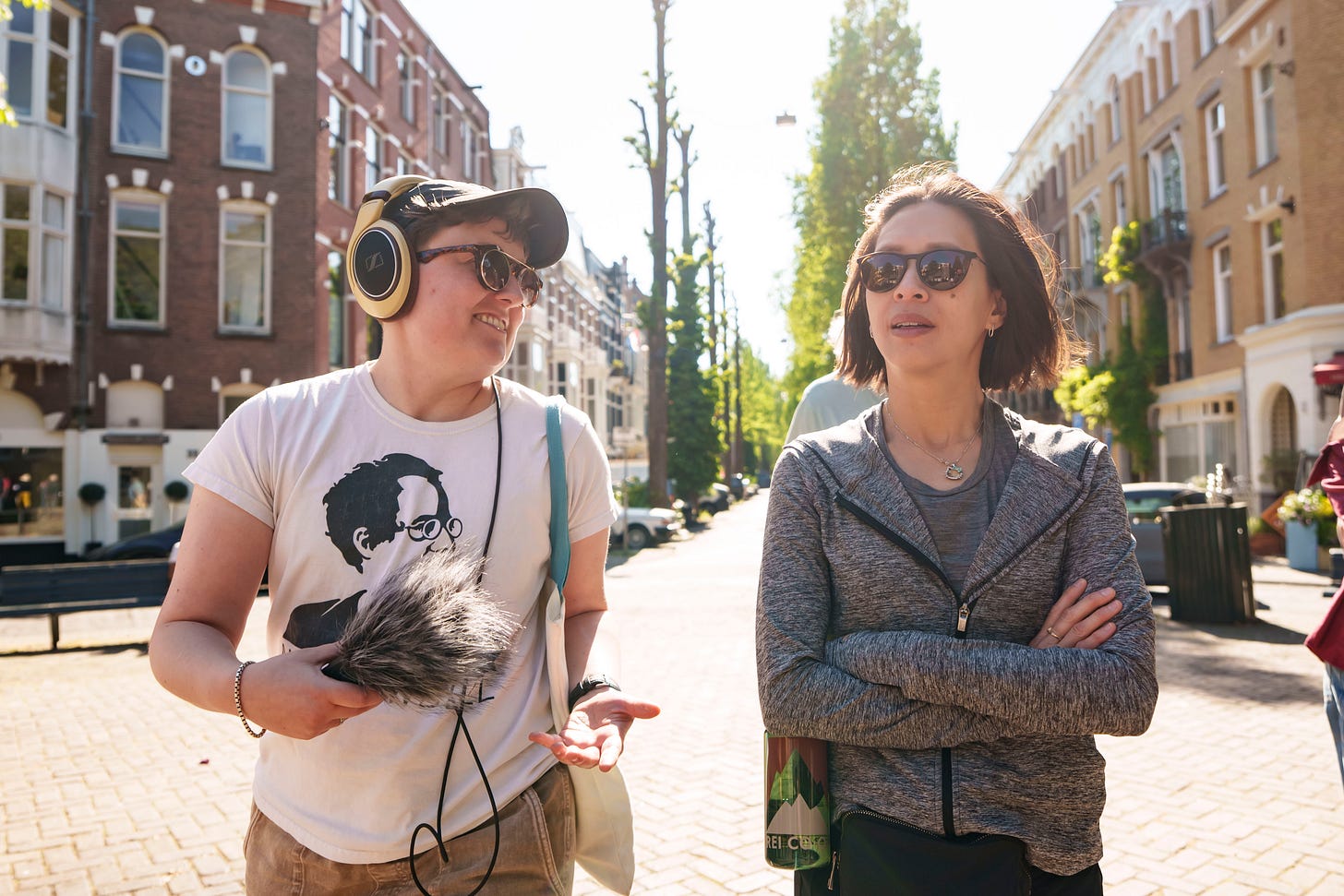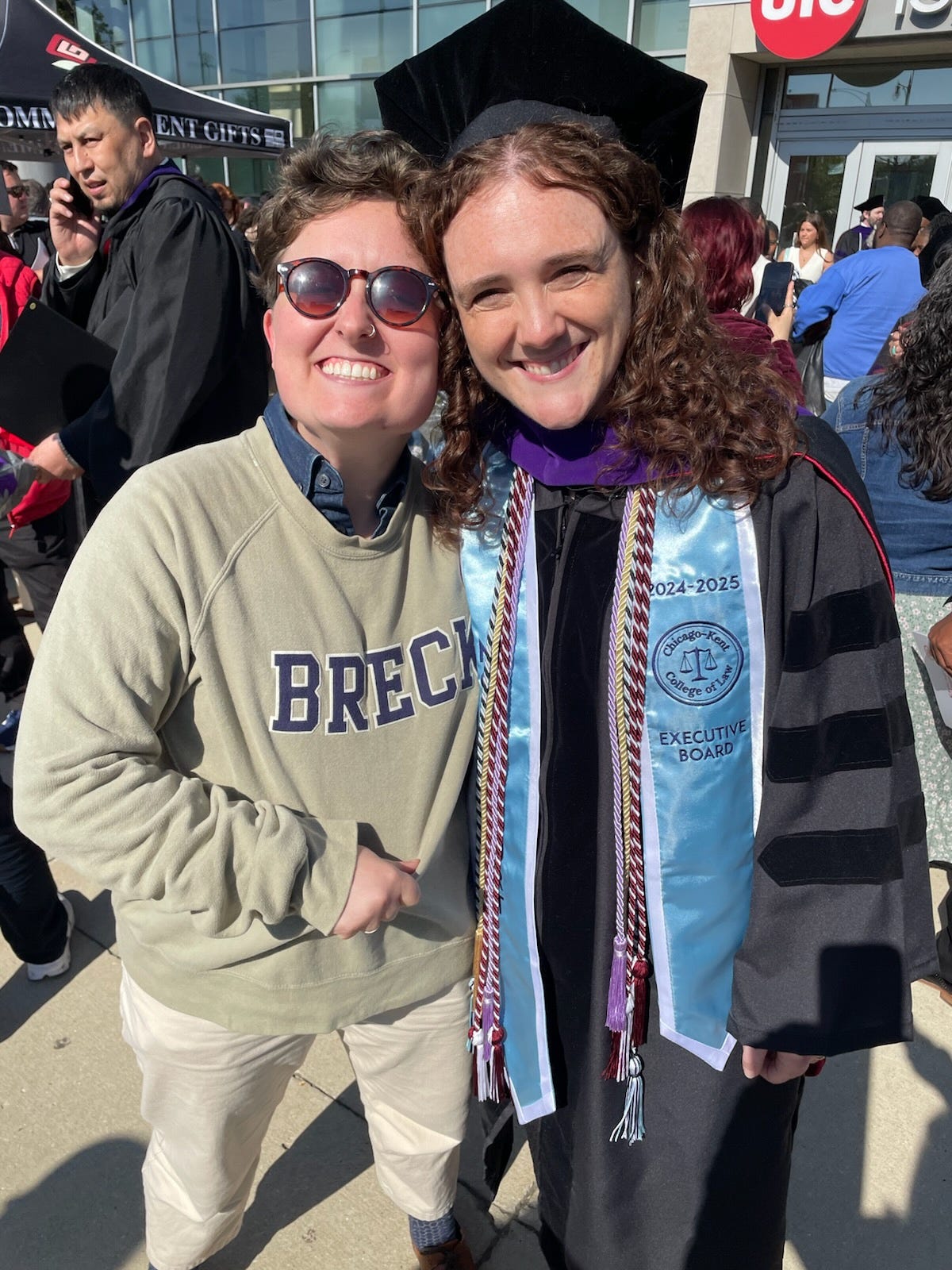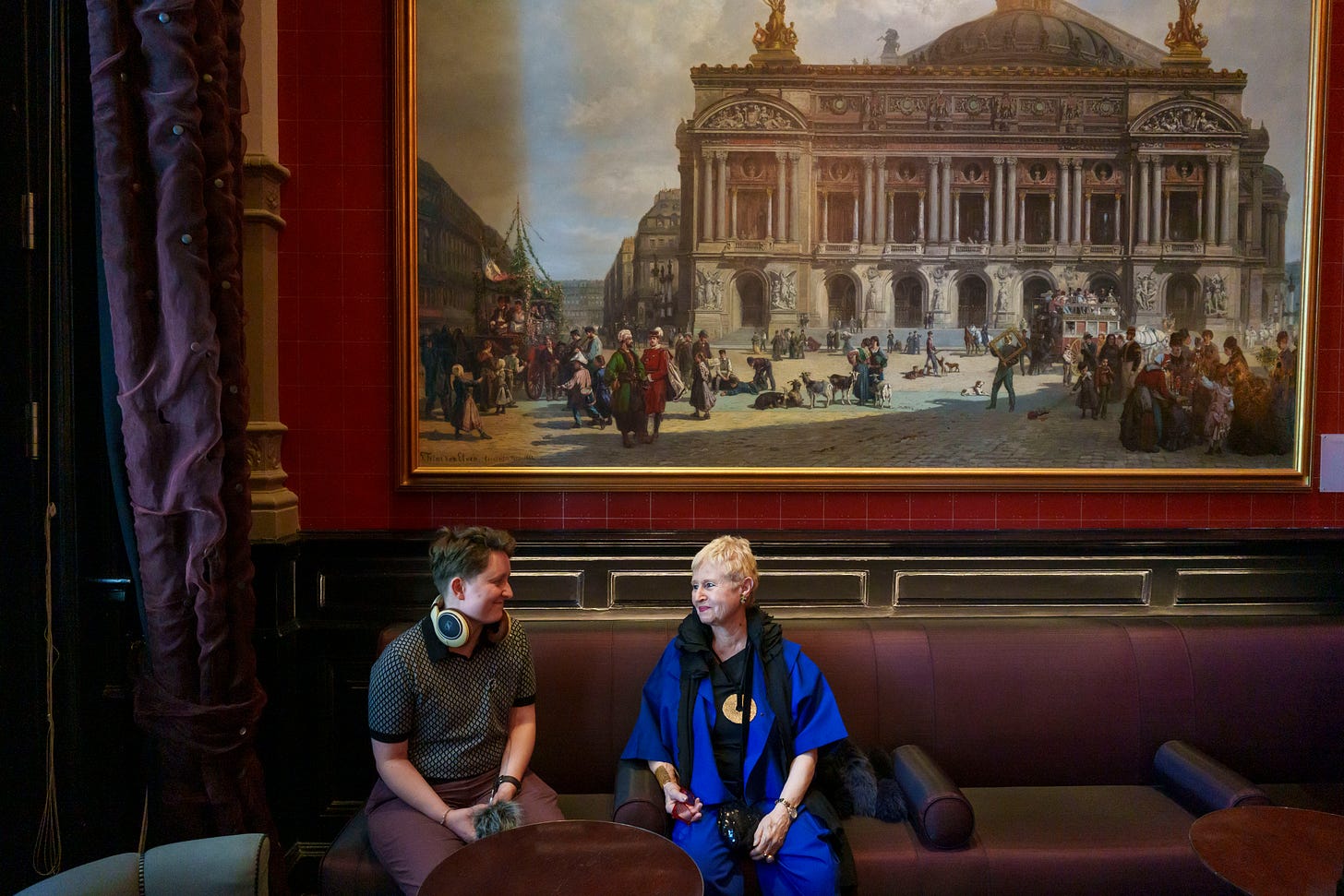Welcome, J.D. (no, not that one)
Plus, reports from the Mahler Festival in Amsterdam
Shabbat shalom, everyone.
Leading today’s newsletter with an extra special announcement: A superstar lawyer is entering a world that desperately needs her! (Though I confess I’m biased.) My wife, Breck, graduated from law school this weekend alongside a wonderful and luminously talented group of friends. She picked up several accolades along the way: Honors Scholar, executive board of Moot Court, Notes & Comments Editor of the Law Review, Lambda member, and teacher’s aide for Property Law.
Breck will spend the next two years at the Seventh Circuit Court of Appeals, working in the staff attorney’s office. After that, as far as I’m concerned, the world is her oyster. (Again… biased.) Public interest and immigration especially beckon, as the world turns on its dark side. She is the most brilliant and fearless person I know.
This newsletter is not sponsored by Air Serbia (though my inbox is open, jussayin’), but creds to the budget airliner for getting me home from Amsterdam in time for Breck’s ceremony.
There, I spent four blissful days reporting on the Mahler Festival, a once-in-a-generation celebration of Mahler’s music hosted by the Royal Concertgebouw. When its third iteration in 2020 was postponed, the originally scheduled New York Philharmonic — once Mahler’s own orchestra — couldn’t make it, having cut back its international touring post-COVID. That left the Chicago Symphony to jump in, conducted by Jaap van Zweden — a conductor that, unfortunately, has been in the news this week after some 50 musicians accused the conductor of severe bullying. (File that under “open industry secrets”: Many of us who have worked in musical circles, even peripherally, have heard versions of these stories.)
A personal note: Mahler is an incredibly important composer to me. Growing up in a non-musical family, his symphonies opened my eyes to what an orchestra could do. Back then, like so many self-absorbed teenagers, I thought I was the only person on the planet who had ever felt the roiling emotions I was dealing with so deeply, so overwhelmingly. Mahler helped me get over that egotism — I mean, they were all right there in his music.
I realized I was not alone. None of us are.
I was able to tell Marina Mahler — Mahler’s granddaughter, and the president of the Mahler Foundation — a version of the above story in person. My hour with her was the highlight of highlights in a magical week. A close second was witnessing the sheer excitement and esprit de corps surrounding the festival. During my time in Amsterdam, I witnessed people rush barricades, tote scores like handbags, and engage in half-drunken debates about Mahler conductors and recordings at local pubs.
Sixteen-year-old Hannah would be floating. So was 29-year-old Hannah.
I am deeply grateful to WBEZ, Chicago’s NPR affiliate, for trusting me to go and being so generous in their assignments. Below are links to the coverage in its entirety.
“Chicago’s Symphony is joining Amsterdam’s big Mahler craze. Read why in this comic.” (studio interview and comic by Eda Uzunlar [!])
“Hear the buzz around the CSO’s debut at Mahler Fest in Amsterdam” (six-minute radio report from Amsterdam)
“Go behind the scenes at the Chicago Symphony Orchestra’s debut at Mahler Fest” (four-minute radio report and article)

Other bylines
Klaus Mäkelä returns to the CSO — and faces the work ahead (Chicago Tribune)
An expanded edition of The First Homosexuals, an inspiring and urgent survey of queer art, takes over Wrightwood 659 (Chicago Tribune)
A CSO cellist makes art out of a sexist jibe, discussed by me and fellow writer–violinist Julia Conrad (for VAN Magazine’s “BarTálk” series)
A lively conversation with the brothers behind Andy’s, the “entry-level jazz club” turning 50 this month (Chicago Tribune)
An inventively reimagined Treemonisha touches down at Harris Theater (Musical America)
Cellist Lia Kohl, on remembering Mars Williams and becoming the backing track to Chicago’s Union Station for a day (Chicago Tribune)
A profile of autodidact pianist Pat Leary, now online (DownBeat)
What’s in the diary? 🗓️
May 24: Mars William’s Devil’s Whistle (8:30 p.m., Constellation)
May 25: Mars Williams’ Toy Story (2 p.m., May Chapel at Rosehill Cemetery) and NRG Ensemble, playing the music of Mars Williams ( 9 p.m., Hungry Brain)
May 30: Ensemble Dal Niente’s season closer (6:30 p.m., Nichols Concert Hall at the Music Institute of Chicago, Evanston) and Third Coast Percussion’s Currents (8:30 p.m., Constellation)
A personal appeal
I have written here (and elsewhere) about Lakeview Orchestra, the community ensemble I’ve played with since 2018. We’re embarking on our spring fundraising drive, which coincides with our June 8 performance of Shostakovich’s Leningrad Symphony. My fundraising team is named, appropriately enough, Shosty’s Angels. (H/t to Charles Palys, our president and associate concertmaster, for that name.)
I have to admit, I felt a little frivolous putting together my personal donation page in the midst of a wholesale assault on immigrants, higher ed, social services… I mean, you name it. Many, many causes could use your dollar right now.
So, in my accompanying essay, I was just honest. You can read that above, but I’ve also pasted it below:
Hi, all —
If you've donated to my appeals before, you know I tend to pop off on these fundraising pages, from claiming I play in a Bruce Springsteen cover band to heartfelt appeals about why community ensembles like Lakeview are so important.
This year feels different. There are so many causes that deserve your attention right now — countless, really. So, instead, I want to talk about one thing and one thing only: the piece Lakeview Orchestra is currently preparing.
Soviet composer Dmitri Shostakovich (1906–1975) wrote his Symphony No. 7 while his hometown of Leningrad was under brutal siege by the Nazis. The details from that period are horrifying. People fried makeup into pancakes, nibbled at wallpaper glue, and drank leather soup in order to stave off starvation. In a letter dated February 1942, Shostakovich describes the city as having “no cats or dogs left”; most were forced to eat their beloved pets. À la Station Eleven, power stopped working, cars stopped running — fuel was blockaded, too — and radio stations fell silent. No one remained to staff them.
But the siege itself had been preceded by an ultra-repressive period we now call the Great Terror. Stalin used his position as the Communist Party’s general secretary to install loyalists, helping him ascend to total power after the death of Vladimir Lenin. Whenever an associate grew too powerful or too well-liked, Stalin concocted accusations against them and had them deposed, or worse. One didn’t need to be a dissident to vanish under Stalin’s regime: He ordered the arrest, imprisonment or murder of countless innocents during what is now known as the Great Terror.
Why am I mentioning this here, during what is supposed to be a rallying fundraiser? I think you can guess. Researching this symphony as Lakeview's new program book annotator, I was humbled by the parallels between our time and 100 years ago, when Stalin was newly empowered. We, too, live under a regime that thrives in chaos and confusion. Its power, too, hinges entirely on a charismatic leader, surrounded by yes-men whom, I suspect, privately believe little of what he says. (I suspect he himself doesn't, either.) Colleagues, classmates and neighbors — some of the most vulnerable in our society — are being snatched off the street without due process.
Shostakovich's Leningrad Symphony feels more urgent than it has in decades. I leave rehearsals completely spent — physically, yes, because the piece is so challenging (and, in many places, loud). But I also leave emotionally wrung out. Like the rest of us, I'm compartmentalizing like crazy just to get through the day. Every Tuesday night, Lakeview makes space for me to look the demons of our age in the eye. And scream through my violin.
To be able to make this music alongside exceptionally talented musicians — some of whom are professionals, some of whom are proud amateurs, like myself — is a privilege I don't take for granted. That privilege relies hugely on your support. Like so many nonprofit arts organizations, Lakeview derives relatively little of its operating expenses through ticket sales. The vast majority of its revenue comes from donor support.
More specifically, your dollars will go towards:
increasing accessibility for our Chicago community: This season, we’re offering 250 free student tickets to help young audiences and families experience live orchestral music without financial barriers.
expanding our guest conductor program: We’re welcoming three distinguished guest conductors next season, each bringing fresh perspectives and elevating our artistic programming.
enhancing the musician experience: With 88 dedicated musicians, we’re investing in rehearsal space upgrades and new artistic development opportunities to ensure our members continue to refine their talents and deliver exceptional performances.
With your donation, you are supporting us in reaching new artistic heights. The Leningrad is one of the most ambitious pieces Lakeview has ever tackled. As we search for a new music director next season, other monumental, urgent works will follow. Music, I've found, is one of the best ways to speak unspeakable truths about our world, whether brutal or beautiful. Shostakovich knew that all too well.
Here’s that donation page one more time, if you feel moved to toss $5 our way.
Heavy rotation
Naturally, I’ve been listening to a lot of Leningrad — previously, gun-to-my-head, a symphony I very happily could have done without. But, as with so many pieces, playing it has made me much more fond of it. (To date, the only pieces that still escape me after performing them are Symphonic Metamorphosis of Themes by Carl Maria von Weber and Mathis der Maler. Sorry, Hindemith. Maybe someday.)
I’m especially struck by the below recording, captured during a 1964 performance by the Symphony Orchestra of the Leningrad State Philharmonic. The performance reunited many of the musicians who played the symphony’s storied 1942 Leningrad premiere, led by the conductor of that same performance, Karl Eliasberg.
Is it the cleanest, most pristine recording? Hell no. But its heart and savage intensity is hot to the touch.
Eliasberg seems to be a complex figure. Many have intimated that his postwar career was stunted by a jealous Yevgeny Mravinsky. But speaking of bully conductors — quite the theme this newsletter — Eliasberg was no peach himself. Musicians remember him as being uncompromising, even during the besieged rehearsals. In one particularly infamous story, a musician arrived late to rehearsals because he was burying his wife. That didn’t matter to Eliasberg, who chastised his selfishness. Something something death, taxes, tyrannical conductors…





